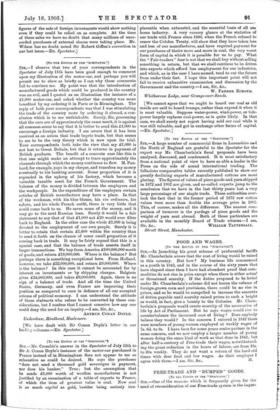FOOD AND WAGES.
[TO THE EDITOR OF THE "SPECTATOR."]
SIR,—In launching his great scheme of preferential tariffs Mr. Chamberlain avows that the cost of living would be raised in this country. But how? My business life commenced as a youth in 1842, and in the course of the sixty years that have elapsed since then I have had abundant proof that com- modities do not rise in price except when there is either actual or threatened scarcity. If the duties proposed to be levied under Mr. Chamberlain's scheme did not lessen the volume of foreign-grown corn and provisions, there could be no rise in prices, and so he would be compelled to increase the amounts of duties payable until scarcity raised prices to such a height as would, in fact, give a bounty to the Colonies. Mr. Cham- berlain's proposals would create scarcity of the necessaries of life by Act of Parliament. But he says wages would rise to counterbalance the increased cost of living ? Does anybody believe they would ? In the concern I entered in 1842 there were numbers of young women employed at weekly wages of 7s. 6d. to 98. I have been for some years senior partner in the same concern, and we now employ a larger number of young women doing the same kind of work as that done in 1842; but after half-a-century of Free-trade their wages, notwithstand- ing the great reduction in the hours of labour, are from 18s. to 20s. weekly. They do not want a return of the hard old times with dear food and low wages. As their employer I
agree with them.—I am, Sir, &c., H.










































 Previous page
Previous page